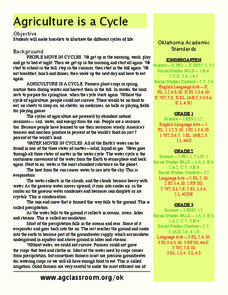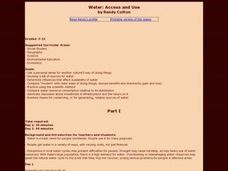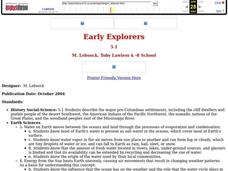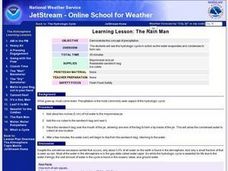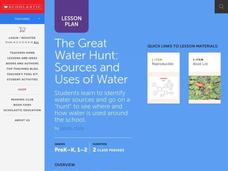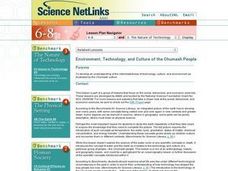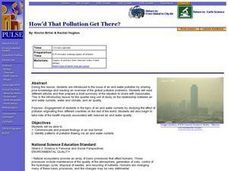Curated OER
Water Cycle: Social Studies Online
If you need a presentation that describes the 3 elements of the water cycle then this PowerPoint could be a good starting point. This resource is basic in its presentation and formating, and only defines the words evaporation,...
Curated OER
Water Supply and Water Uses
A large variety of topics are given in this PowerPoint about water. Some come from a scientific point of view, some regarding recreation, some for domestic use, and others from hydroelectricity. A teacher could choose to use this...
Curated OER
Water: Our Most Important Beverage
Third graders create a KWL chart about water. In this environmental science lesson plan, 3rd graders demonstrate how much water on Earth is usable. They act out the different stages of the water cycle.
Curated OER
Water Cycle -- Presentation Teaching Model
Students continue their examination of the water cycle. In groups, they present their findings to the class after researching a specific topic related to the water cycle. They spend the rest of the lessons asking questions and answering...
Curated OER
Agriculture is a Cycle
Students explore cycles in nature. In this cross curriculum agriculture lesson, students define "cycle" and research weather and planting folklore. Students make a bracelet in which individual colored beads represent the many "cycles" of...
Curated OER
Water: Our Most Important Beverage
Third graders complete a KWL chart on what they already know about water and what they want to know. As a class, they participate in an activity in which they discover the amount of drinkable water on Earth and are introduced to the...
Berkshire Museum
The Three Life-Giving Sisters: Plant Cultivation and Mohican Innovation
Children gain first-hand experience with Native American agriculture while investigating the life cycle of plants with this engaging experiment. Focusing on what the natives called the Three Sisters - corn, beans, and squash - young...
Curated OER
Water: Access and Use
Learners get a personal sense for another culture's way of doing things. Develop a list of sources for water. Practice using the scientific method. Examine means for conserving, or for generating, reliable sources of water.
Curated OER
Water as a Cycle
Learners collaborate with a partner to create a large diagram containing one aspect of the water cycle. They are encouraged to include academic language and pictures for their presentation. Their is a peer evaluation sheet that is...
Curated OER
The Black Death: 1347 - 1351
Grim and gruesome, the Black Death literally infects history with its social and political ramification. Your class will be positively agog over the details of the Plague, from its causes to its symptoms, and eventually to its grisly end...
Curated OER
Early Explorers
Fifth graders study early explorers. In this World history lesson plan, 5th graders draw an outline of a map labeling each part, build geographical features out of dough, and paint each of the land and water features.
Curated OER
Watersheds: The San Francisco Bay Watershed
Sixth graders make a model of a watershed. In this geography instructional activity, 6th graders view a shaded relief map of California and locate landmarks. Students examine the San Francisco Bay Watershed by following the journey...
Curated OER
Learning Lesson: The Rain Man
Learners participate in a demonstration showing the concept of precipitation. They view the hydrologic cycle and identify its stages, and discuss flash flood safety at the end the lesson.
Curated OER
The Great Water Hunt
Students create a model of the land to water ratio in a large group and search for all the places water is used at their school while on a Great Water Hunt. They identify where water can be found and compare how much of world is covered...
Curated OER
Spin Cycle
Students explore the concept of "spin" and discuss how politicians use spin to sway public opinion. A leading American politician is selected and talking points that exemplify the main idea of this lesson are shared with the class.
Curated OER
It's So Sticky Outside That...
Students examine the phases of the water cycle and water's different forms it can have. They work in groups to create pantomimes to illustrate the water cycle to their classmates.
Curated OER
The Watershed Quest
Learners examine their connection to local watersheds. They describe the water cycle and list species living in their local watershed. They also draw a map of their community.
Curated OER
Environment, Technology, and Culture of the Chumash People
Middle schoolers develop an understanding of the interrelatedness of technology, culture, and environment as illustrated by the Chumash culture. They research the tribe and complete a table for the Chumash people describing their...
Curated OER
THE GULF STREAM
Students explore how to describe the Gulf Stream, how Benjamin Franklin charted it, and correctly plot it on a map.
Curated OER
Environment: How'd That Pollution Get There?
Students examine how global wind and water patterns aid in the spread of worldwide pollution. In groups, they read articles about the domino effect of pollution and create posters displaying its journey. On blank world maps, students...
Curated OER
Flush It! Throw It! Out of Sight, Out of Mind!
Students describe disposal procedures by reviewing water and solid waste disposal cycles and what happens when one step is omitted. They examine the connection between industry and human health.
Curated OER
Google Earth Geology Field Trip
Students take a virtual field trip around California using Google Earth. In this geology field trip lesson, students explore landforms and a variety of rocks located in California. Students compare environments where rocks are...
Curated OER
Layer By Layer
Have your class learn about the formation of the Grand Canyon using this lesson. After listening to a variety of stories about the Grand Canyon and erosion, learners complete worksheets related to the geology of this area. What a...
Curated OER
Industrialization of the American Landscape
Students summarize the three sectors of industry and how these sectors applied to the Industrial Revolution. Students apply their skills in research and note-taking, as well as vocabulary building through web organizers. Students...




